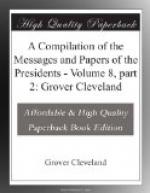A misconstruction of his authority by Captain Nicholson in relation to vessels of friendly nations captured by the French renders it necessary that I should make some explanatory observations on that subject. Our laws direct the capture of all armed vessels sailing under authority or pretense of authority from the French Republic. A vessel captured by the citizens of France must be considered as sailing under the authority of France, and it is scarcely to be supposed that in times like the present, when few vessels sail without arms, a captured vessel in possession of the captors will be so circumstanced as not to come under the description of an armed vessel within the meaning of our laws. To justify a recapture nothing is necessary but that the vessel be provided with such means of annoyance as will render her dangerous to an unarmed American vessel in pursuit of lawful commerce. If, however, the vessel can not be considered an armed vessel within the meaning of our laws, you are not to recapture her unless you should have probable cause to suspect that the citizens of the United States or persons resident therein have some interest in the vessel or cargo.
It is always your duty to recapture American property and property of persons resident within the United States whenever found in possession of the French on the high seas.
I have the honor to be, sir, your most obedient servant,
BEN. STODDERT.
[From Claypoole’s American Daily Advertiser, Philadelphia, December 20, 1799.]
The President with deep regret announces to the Army the death of its beloved chief, General George Washington. Sharing in the grief which every heart must feel for so heavy and afflicting a public loss, and desirous to express his high sense of the vast debt of gratitude which is due to the virtues, talents, and ever-memorable services of the illustrious deceased, he directs that funeral honors be paid to him at all the military stations, and that the officers of the Army and of the several corps of volunteers wear crape on the left arm by way of mourning for six months. Major-General Hamilton will give the necessary orders for carrying into effect the foregoing directions.
Given at the War Office of the United States, in Philadelphia, this 19th day of December, A.D. 1799, and in the twenty-fourth year of the Independence of the said States.
By command of the President:
JAMES M’HENRY,
Secretary of War.
[From Claypoole’s American Daily Advertiser, Philadelphia, December 21, 1799.]
NAVY DEPARTMENT, December 20, 1799.
The President with deep affliction announces to the Navy and to the marines the death of our beloved fellow-citizen, George Washington, commander of our armies and late President of the United States, but rendered more illustrious by his eminent virtues and a long series of the most important services than by the honors which his grateful country delighted to confer upon him.




